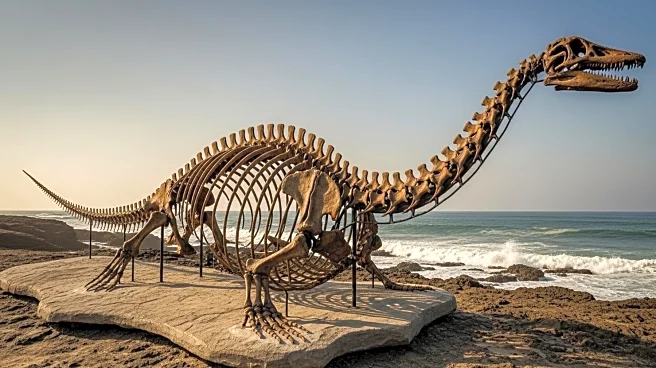What's Happening?
A new species of ancient marine reptile, named Xiphodracon goldencapsis, has been discovered in England. The fossils, found by professional fossil collector Chris Moore in 2001, were unearthed in the Golden Cap of Charmouth, a region along the English Channel known for its abundance of fossils. The species is an ichthyosaur, a large extinct marine reptile that lived during the Early Jurassic era approximately 190 million years ago. The discovery was detailed in a study published in the journal Papers in Palaeontology. The fossil set includes a skull with a large eye socket and a long snout, and it was almost perfectly preserved in three dimensions. Researchers noted unique features such as unusual bones around the external nostrils and a round nasal opening, distinguishing it from other ichthyosaurs of the period.
Why It's Important?
The discovery of Xiphodracon goldencapsis adds significant knowledge to the understanding of marine life during the Early Jurassic era. Ichthyosaurs were active ocean predators, and this particular species provides insights into the diversity and evolutionary adaptations of marine reptiles during a time when several ichthyosaur families were going extinct. The fossil's preservation allows researchers to study its anatomy in detail, offering clues about its diet and ecological role. This contributes to the broader understanding of prehistoric marine ecosystems and the evolutionary history of marine reptiles.
What's Next?
The study of Xiphodracon goldencapsis may lead to further research into the evolutionary pathways of ichthyosaurs and their extinction patterns. Researchers might explore other fossil sites to find additional specimens that could provide more information about the species' distribution and ecological interactions. The findings could also prompt a reevaluation of existing ichthyosaur fossils to identify other potential new species.
Beyond the Headlines
The discovery highlights the importance of fossil preservation and the role of professional collectors in uncovering significant paleontological finds. It underscores the value of regions like the Jurassic Coast in England, which continue to yield important scientific discoveries. The study of such fossils can also inform modern conservation efforts by providing historical context for marine biodiversity and extinction events.









